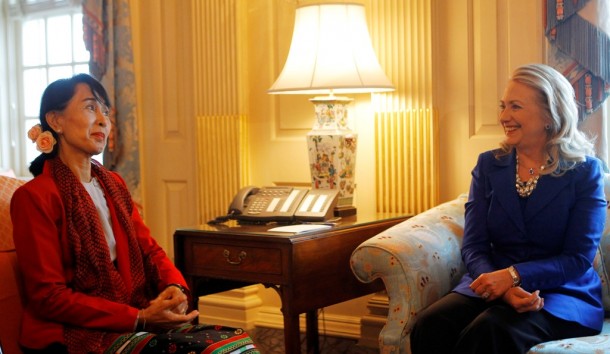WASHINGTON DC—Coming out in support of easing US sanctions, opposition leader Aung San Suu Kyi said on Tuesday that the people of Burma should not depend on international trade restrictions to keep up the momentum of the democracy movement.
“I do support the easing of sanctions. I think that our people must start taking responsibility for their own destiny. I do not think we should depend on US sanctions to keep up the momentum of our movement for democracy,” said Suu Kyi in response to a question on the US-Burma relationship after her speech in Washington on Tuesday.
“We’ve got to work at it ourselves. And there are very many other ways in which the United States can help us to achieve our democratic ends and help us to build up the kind of democratic institutions that we are in such need of. Sanctions are not the only way. We are very, very grateful for the fact that sanctions were instituted in the past. It helped us greatly,” she said.
Suu Kyi said she does not agree with critics who say that sanctions are the ultimate cause of Burma’s current economic woes.
“But [sanctions] certainly had a very great political effect and the fact that so many people try to blame sanctions for the economic ills of the country only proves how potent it was as a weapon,” she said. “If you read the reports of the IMF [International Monetary Fund] you will find that sanctions in fact had very little economic impact in Burma.”
Suu Kyi said that for many years the dictatorship in Burma claimed that US sanctions had no effect whatsoever and that they did not care about the trade restrictions.
“But then lately, in the last years of military rule, United States sanctions were blamed for all the economic ills of Burma. Not just the economic ills, but other ills as well. And there is great eagerness for these sanctions to be removed,” she told the event organized by the Asia Society, US Institute of Peace and State Department.
In early August, the United States renewed the Burmese Freedom and Democracy Act for another year with lawmakers calling for further reforms including an end to ethnic conflicts and the release of political prisoners. The legislation bans imports of Burmese products and was passed despite other restrictive measures prohibiting investment in the former pariah state recently being eased by Washington.
“On my part, I do not think that we need to cling onto sanctions unnecessarily,” said Suu Kyi. “Because I want our people to be responsible for their own destiny and not to depend too much on external props. We will need external help. We will need the help of our friends abroad, from all over the world. But in the end, we have to build our own democracy for ourselves.”
Earlier in her address, Suu Kyi praised the role of President Thein Sein in the reform process. “We must remember that the reform process was initiated by President Thein Sein,” she said. “I believe that he is keen on democratic reforms. But how the executive goes about implementing these reforms is what we have to watch.
And the Nobel Laureate emphasized the need to gauge democracy by examining all three arms of government—executive, legislature and judiciary. “We cannot judge how genuine or how sustainable the democratization of Burma is simply when looking at the executive, neither can we do it by looking simply at the legislature, nor by looking simply at the judiciary,” she said.
Meanwhile, Secretary of State Hillary Clinton used the same event to praise the reform process in Burma while calling for further progress towards democratization.
“Those flickers of progress that President Obama spoke of last—a year ago, summer—have been growing and strengthening in the times since,” she said. “Hundreds of prisoners of conscience have been released over the past year, including some just this week. Opposition political parties have been legalized and their members have won seats in Parliament.”
Yet Clinton insisted that her administration would continue to push for further changes in the military-dominated nation.
“Political prisoners remain in detention,” she said. “Ongoing ethnic and sectarian violence continues to undermine progress toward national reconciliation, stability and lasting peace. Some military contacts with North Korea persist. And further reforms are required to strengthen the rule of law, increase transparency and address constitutional challenges.”
















